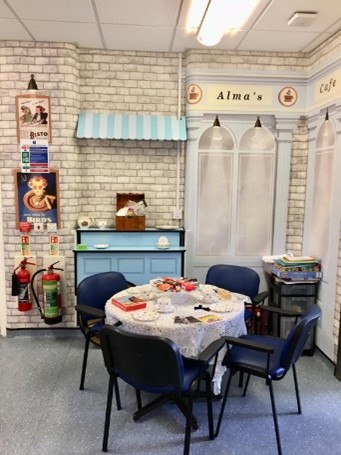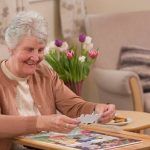- Have any questions? Call us on
- 0113 230 2046
- sales@findmemorycare.co.uk
Creating a dementia inclusive environment. Dementia alone affects 46 million people worldwide, a number likely to grow further as life expectancy continues to increase. The need for us to improve products and environments couldn’t be more crucial, however with concerns over financial return, changing the care environment can often be seen as something hard to justify and time consuming.
However, this does not have to be the case. Caring for people living with dementia means finding new, adapted and often innovative ways to support everyday living. At Find Memory Care we specialise in creating environments and products that encourage engagement and social interaction. The outcomes of making the changes include increased independence, an enhanced the quality of life, wellbeing and contentment.
Independence – Enhancing environments to ensure accessibility and comfort for all can make a significant difference to the mental and physical wellbeing for the people living in that space, for instance signage, Signs are a wayfinding aid and when designed and used correctly, will enable a person to maintain their independence and to locate a particular room quickly and easily.
This brings with it a range of benefits including a reduction in slips, trips, and falls, agitation and anxiety levels.

Stimulation – By enhancing the environment to compensate for deteriorating skills the quality of life and overall wellbeing of the person can be improved. Appropriately positioned murals offer residents choices about where to go and what to do and can encourage social interaction and engagement with their surroundings as well as providing appropriate levels of stimulation. There is a list of additional health and wellbeing benefits too, which includes increased levels of exercise and in turn, increased levels of nutrition and hydration.

Engagement – Something as simple as a jigsaw puzzle can be both soothing and engaging. A dementia inclusive jigsaw puzzle with visual memory prompts practical frames and user-friendly piece sizes can provide those living with dementia and the people around them an activity they can do together.

Eating – Getting someone with dementia to eat a nutritious meal or even to eat enough can become a problem as dementia progresses, but help can come from something as simple as changing the dinner plates. A study conducted by Boston University found that patients who ate from brightly coloured plates without patterns consumed 25% more food, the reason for this could be that many people with dementia have difficulty with sight and perception and the coloured plates can help them to distinguish and recognise the food.
The team at Find are experts in help care facilities enhance their environments. If you would like to find out more contact a member of our team
Find Memory Care
3 Modder Avenue
Armley
Leeds
LS12 3DB
© Copyright 2021 Find Signage Ltd – Registration number is 06825901.
Find Memory Care
We firmly believe that the internet should be available and accessible to anyone, and are committed to providing a website that is accessible to the widest possible audience, regardless of circumstance and ability.
To fulfill this, we aim to adhere as strictly as possible to the World Wide Web Consortium’s (W3C) Web Content Accessibility Guidelines 2.1 (WCAG 2.1) at the AA level. These guidelines explain how to make web content accessible to people with a wide array of disabilities. Complying with those guidelines helps us ensure that the website is accessible to all people: blind people, people with motor impairments, visual impairment, cognitive disabilities, and more.
This website utilizes various technologies that are meant to make it as accessible as possible at all times. We utilize an accessibility interface that allows persons with specific disabilities to adjust the website’s UI (user interface) and design it to their personal needs.
Additionally, the website utilizes an AI-based application that runs in the background and optimizes its accessibility level constantly. This application remediates the website’s HTML, adapts Its functionality and behavior for screen-readers used by the blind users, and for keyboard functions used by individuals with motor impairments.
If you’ve found a malfunction or have ideas for improvement, we’ll be happy to hear from you. You can reach out to the website’s operators by using the following email
Our website implements the ARIA attributes (Accessible Rich Internet Applications) technique, alongside various different behavioral changes, to ensure blind users visiting with screen-readers are able to read, comprehend, and enjoy the website’s functions. As soon as a user with a screen-reader enters your site, they immediately receive a prompt to enter the Screen-Reader Profile so they can browse and operate your site effectively. Here’s how our website covers some of the most important screen-reader requirements, alongside console screenshots of code examples:
Screen-reader optimization: we run a background process that learns the website’s components from top to bottom, to ensure ongoing compliance even when updating the website. In this process, we provide screen-readers with meaningful data using the ARIA set of attributes. For example, we provide accurate form labels; descriptions for actionable icons (social media icons, search icons, cart icons, etc.); validation guidance for form inputs; element roles such as buttons, menus, modal dialogues (popups), and others. Additionally, the background process scans all the website’s images and provides an accurate and meaningful image-object-recognition-based description as an ALT (alternate text) tag for images that are not described. It will also extract texts that are embedded within the image, using an OCR (optical character recognition) technology. To turn on screen-reader adjustments at any time, users need only to press the Alt+1 keyboard combination. Screen-reader users also get automatic announcements to turn the Screen-reader mode on as soon as they enter the website.
These adjustments are compatible with all popular screen readers, including JAWS and NVDA.
Keyboard navigation optimization: The background process also adjusts the website’s HTML, and adds various behaviors using JavaScript code to make the website operable by the keyboard. This includes the ability to navigate the website using the Tab and Shift+Tab keys, operate dropdowns with the arrow keys, close them with Esc, trigger buttons and links using the Enter key, navigate between radio and checkbox elements using the arrow keys, and fill them in with the Spacebar or Enter key.Additionally, keyboard users will find quick-navigation and content-skip menus, available at any time by clicking Alt+1, or as the first elements of the site while navigating with the keyboard. The background process also handles triggered popups by moving the keyboard focus towards them as soon as they appear, and not allow the focus drift outside it.
Users can also use shortcuts such as “M” (menus), “H” (headings), “F” (forms), “B” (buttons), and “G” (graphics) to jump to specific elements.
We aim to support the widest array of browsers and assistive technologies as possible, so our users can choose the best fitting tools for them, with as few limitations as possible. Therefore, we have worked very hard to be able to support all major systems that comprise over 95% of the user market share including Google Chrome, Mozilla Firefox, Apple Safari, Opera and Microsoft Edge, JAWS and NVDA (screen readers).
Despite our very best efforts to allow anybody to adjust the website to their needs. There may still be pages or sections that are not fully accessible, are in the process of becoming accessible, or are lacking an adequate technological solution to make them accessible. Still, we are continually improving our accessibility, adding, updating and improving its options and features, and developing and adopting new technologies. All this is meant to reach the optimal level of accessibility, following technological advancements. For any assistance, please reach out to
